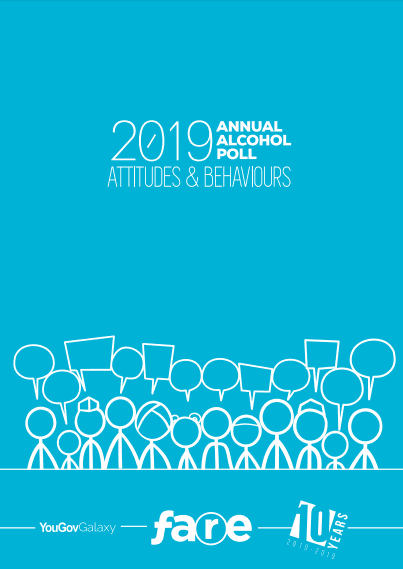Australians Think Their Country Has an Alcohol Problem
The number of people who consume alcohol to get intoxicated has edged close to half the people who use alcohol, around six million Australians, despite little change in overall alcohol consumption.
Alcohol harm has continued to increase despite the fact that overall consumption has remained relatively constant over the past 10 years, with no significant fluctuations,” said Michael Thorn, the Chief Executive of the Foundation for Alcohol Research and Education, as per FARE media release.
The 2019 Annual Alcohol Poll: Attitudes and Behaviours shows a steady climb over the past decade of people consuming alcohol wanting to get intoxicated, from 35 to 47%. The Poll also found Australians remain confused about what constitutes low-risk to high-risk alcohol consumption.
The Poll highlights further the dangerous lack of clarity about the long-term risks of consuming alcohol, including mouth, pharynx, larynx, oesophagus, liver and breast cancer. Fewer than half of Australians are aware of the link between alcohol use and mouth and throat cancer (29%) and breast cancer (16%).
FARE believes Australians are confused about cancer and other health risks due to nebulous ideas such as ‘responsible consumption of alcohol’ and ‘using alcohol in moderation’ which are commonplace in alcohol marketing.
The Poll results clearly demonstrate how ambiguous and subjective the concept of ‘responsible consumption of alcohol’ actually is, when 68% of alcohol users who typically consume 11 or more standard units, which is above the recommended consumption level, consider themselves responsible consumers.
Despite there being no safe level of consumption for alcohol, Australia’s National Guidelines for Alcohol Consumption recommend adults consume no more than two standard units of alcohol per day to reduce the lifetime risk of harm, and no more than four standard units on a single occasion to reduce the risk of alcohol-related injury.
Evidently there is nothing responsible about consuming 11 units of alcohol even though Australians who do so seem to think they are responsible consumers.
Unfortunately the 2019 @FAREAustralia poll reveals there is still limited awareness in Australia that alcohol causes breast cancer (16%) and mouth/throat cancer (29%). Hopefully media campaigns can improve this! #alcohol #cancer #breastcancer @CCNewSouthWales @CCNSWResearch pic.twitter.com/MfY5bfb0Qo
— Pete Sarich (@PeteSarich) May 8, 2019
Key findings from the Poll
- 66% of people believe that Australia has a problem with heavy alcohol use or abuse.
- 75% of Australians believe that more needs to be done to reduce the harm caused by alcohol.
- Fewer than half of Australians are aware of the link between alcohol use and stroke (41%), mouth and throat cancer (29%) and breast cancer (16%).
- 53% of people believe that alcohol-related problems in Australia will worsen or remain the same over the next five to ten years.
- 47% of Australian alcohol users consume alcohol to get intoxicated.
- 78% of Australian alcohol users who consume alcohol to get intoxicated, consider themselves a responsible alcohol consumer.
- 38% of Australians have been affected by alcohol-related violence, including 18% who have been victims of alcohol-related violence.
- 23% of parents or guardians with a child under 18 report that their child had been harmed or put at risk of harm because of someone else’s alcohol use.
- More than 80% of Australians believe people have a right to know about a wide range of alcohol-related harms.
All #Australians deserve to feel safe in their homes and communities.#AlcPoll2019 #auspol #alcohol #AlcoholViolence #domesticviolence pic.twitter.com/PQks2OW6WE
— FARE (@FAREAustralia) May 8, 2019
Tackling the alcohol problem in the country
Fare believes the government needs to invest more in prevention to tackle the growing alcohol issue. They provide several priority actions to curb the harm.
- Raising awareness of the short-term and long-term risks of alcohol use,
- Special awareness campaigns on alcohol harm during pregnancy to prevent Fetal Alcohol Spectrum Disorder (FASD),
- Putting pregnancy warning labels on alcohol products,
- Protecting young people from alcohol advertising,
- Banning all advertising and sponsoring of alcohol at sporting events and during sports broadcasts.
A government that implements these priority actions will have the support of the country, with more than four in five Australians believing that people have a right to know about alcohol-related harm, and the majority (75%) believing that more needs to be done to reduce alcohol harm,” said Michael Thorn, as per FARE.
Anthony Shakeshaft from the National Drug and Alcohol Research Centre (NDARC) believes increasing awareness and education alone wouldn’t reduce alcohol consumption at a population level.
All the evidence we’ve got says you need other strategies to do that [reducing alcohol consumption at a population level] — things like controls on advertising, price, availability,” said Anthony Shakeshaft from the National Drug and Alcohol Research Centre (NDARC), as per ABC News.
